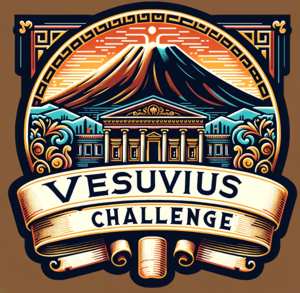| Vesuvius Challenge Continues |
| Written by Sue Gee |
| Sunday, 28 April 2024 |
|
The Vesuvius Challenge is a machine learning and computer vision competition which started in March 2023. Its overarching aim is to read the contents of physically impenetrable Herculaneum Papyri burnt by fire and then buried under volcanic ash when Mount Vesuvius erupted in 79 AD. The idea of a contest the would appeal to the machine learning community came from Nat Friedman, the former CEO of GitHub, who had become obsessed with the scrolls during the 2020 Covid lockdown. As he pointed out in his initial announcement of the Vesuvius Challenge with a post on Twitter (before it was X), people have been trying to read the Herculaneum Papyri for 275 years. After an Italian farmer digging a well in 1750 encountered a marble pavement, excavations unearthed beautiful statues and frescoes and hundreds of scrolls. The Villa of the Papyri had belonged to the father-in-law of Julius Cesar and contained texts that were already ancient before the volcanic event that simultaneously destroyed them by fire and preserved them in mud. Attempts made over the years to unroll the scrolls by hand led mostly to their destruction but also to tantalizing fragments suggesting the importance of their contents but modern technology provides ways of seeing inside the scrolls without opening them.
Dr. Brent Seales, a computer scientist at the University of Kentucky, who in 2015 had "read" the En-Gedi scroll, aka Dead Sea scroll, using X-ray tomography, applied the same approach to the even more fragile Herculaneum Papyri, and in 2019 started to use a particle accelerator to scan two full scrolls and several fragments. By early 2023 the team's machine learning model had managed to recognize ink from the X-ray scans and had even uncovered some characters in hidden layers of papyrus. As I outlined in Can ML Unlock The Secrets of the Herculaneum Scrolls?, the goal for the first stage was to read at least four passages from one of the scanned but unopened scrolls by the end of 2023. Despite this being a very tall order it was indeed achieved. Success can be attributed to several factors - as well as being intrinsically interesting prizes amounting to more than $1M were on offer, including "progress prizes" awarded at intervals for a wide variety of achievements, see Vesuvius Challenge - Progress and Prizes. The way in which the task was broken down into logical stages and the open source nature of the early stages meant sharing and collaboration were encouraged, which allowed contestants to build on what others had achieved. For more about what was accomplished in Stage 1 during 2023 see Exciting Progress In Vesuvius Challenge and Success For Vesuvius Challenge. Now that it has proved possible to read text from inside the scrolls, the goal for 2nd year is to read 90% of each of four scanned scrolls. Another goal is to automate the segmentation procedure, i.e. the 3D mapping of sheets of papyrus in a 3D X-ray volume so that the resulting surface volumes can be used directly to look for ink, so that results that are currently achieved over a long period at at great expense can be done more quickly and cheaply with the goal of being able to It is thought that it might be possible to bring the cost of segmenting an entire scroll to $5000 or below and might even be possible to fully automate it. The following prizes are on offer:
Stage Two started last month and the first month's prizes, a total of $42,500 to ten individuals, have already been awarded, reflecting that a lot of progress had already been made. Another part of the endeavour to decipher the Herculaneum Papyri is being undertaken by scholars under the auspices of the "GreekSchools" project, funded by the European Research Council. It began three years ago and will continue through 2026 and has also experienced success in extracting text from a scroll containing the History of the Academy of Philodemus of Gadara (110-40 BC). The techniques being used include infrared and ultraviolet optical imaging, thermal imaging, tomography, and digital optical microscopy. So far approximately 1,000 words have been identified (around 30% of the text entirety) which includes new details about Plato, the development of his Platonic Academy, and information that identifies his place of burial. In addition the text has revealed that Plato was sold as a slave following the conquest of the island of Aegina by the Spartans sometime around 404 BC to 399 BC. Success in the Vesuvius Challenge towards auto-segmentation will contribute to the ongoing work of scholars and make it possible to extract the contents of the more than 300 scrolls already in storage. Another aim in the longer term is to motivate further excavation of the Villa of Papyri and revelations like those about Plato should help inspire such efforts.
More InformationRelated ArticlesSuccess For Vesuvius Challenge Exciting Progress In Vesuvius Challenge Vesuvius Challenge - Progress and Prizes Can ML Unlock The Secrets of the Herculaneum Scrolls?
|
| Last Updated ( Sunday, 28 April 2024 ) |


